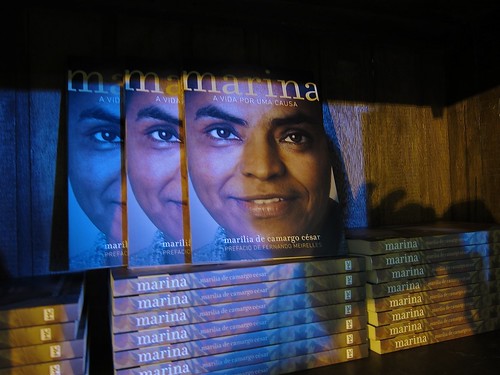
"Marina - A Life for a Cause"
Marina Silva, with a surprisingly strong showing of 20%, has forced Brazil's presidential election into a second-round run-off between the leading candidates Dilma Rousseff and José Serra. Now, both the right and the left must compete for her support and supporters whose strong campaign has centered on the cause of sustainability.
Here is the Economist's quick analysis of the nearly complete results.
A RUN-OFF IN THE OFFING
Oct 4th 2010, 1:14 by H.J. | BRASÍLIA
WITH 97% of the votes counted, it is now certain that Brazil’s presidential race will go to a second round. Dilma Rousseff, the chosen successor of Luiz Inácio Lula da Silva, the popular president, made an unexpectedly poor showing, at just over 46% of all votes counted so far. That will rise a smidgen, since the last votes to come in are those from the poor north-eastern states, where Llua is revered. But her expected gains there will not be enough to secure an absolute majority, and thus avoid a run-off on October 31st.
That two-horse race will be between Ms Rousseff and José Serra of the centre-right Party of Brazilian Social Democracy (PSDB). He is currently on just under 33%, and Marina Silva of the Green Party has amassed almost 20%. That is an extraordinary result for her: until just a couple of weeks before the end of the race she was polling below 10%. Even though she had picked up a couple of percentage points since then, just this morning analysts were saying that she would be delighted with 15%.
The run-off will depend on how Ms Silva’s voters split between Ms Rousseff and Mr Serra. They might be influenced by Ms Silva’s endorsement, should she issue one—and since as a presidential candidate she has had to step down as a senator, she might well accept the offer of a job in a future cabinet in return. Although she does not like Ms Rousseff, whom she blames for the un-green policies that pushed her to leave Lula’s government and join the Green Party, I just can’t see her throwing her lot in with Mr Serra. Staying aloof from both would risk leaving her jobless, and at risk of losing the political momentum that is clearly building behind her.
I’m learning these results in probably the most atypical part of Brazil. The capital, Brasília, has far fewer poor people and many more well-educated ones than the country at large. Here, Ms Silva got more votes than either Ms Rousseff or Mr Serra. By contrast, in Ms Silva’s home state of Acre, in the north of Brazil—poor, rural and with high illiteracy rates—she did poorly.
So what happened to Ms Rousseff? Voter complacency, perhaps: front-runners often do a little worse than expected as their supporters think they needn’t bother turning out. Voting in Brazil is compulsory, but only 80% actually attend polling stations on the day. As everywhere, the stay-aways generally tend to be poorer and to live in rural areas—which in Brazil means they tend also to support Ms Rousseff's Workers' Party. Scandals may also have played a part: although voters told pollsters they were not terribly bothered by accusations of influence-peddling in the chief-of-staff’s office, which was Ms Rousseff’s patch until she stepped down to start campaigning, a few may have thought again. Ms Silva is becoming fashionable, and her life history is the closest of all the candidates’ to the sainted Lula’s. He, after all, stood for president and lost three times before finally being elected.






No comments:
Post a Comment